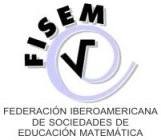Construir comunidad en Educación Matemática
Resumen
Las sociedades esperan que cada vez más profesores de matemáticas puedan ofrecer mejores oportunidades de aprendizaje a sus estudiantes. Para ello, las universidades ofrecen esquemas de formación que suelen ser de alcance reducido y que proporcionan soluciones parciales a las necesidades de los profesores. El desarrollo y consolidación de comunidades de profesores que enseñan matemáticas es un camino para contribuir a ese propósito. En este artículo, presentamos los recursos y espacios de interacción que UED, el centro de investigación y formación en Educación Matemática de la Universidad de los Andes, ha hecho para la consolidación de una comunidad en Educación Matemática: la comunidad AYEM.
Descargas
Citas
Brodie, K. (2014). Professional Learning Communities in Mathematics Educa-tion. In S. Lerman (Ed.), Encyclopedia of Mathematics Education (pp. 501-505). Springer. https://doi.org/10.1007/978-94-007-4978-8_130
Figueroa, M., García, S., Maldonado, D., Rodríguez, C., Saavedra, A. M., & Vargas, G. (2018). La profesión docente en Colombia: normatividad, formación, selección y evaluación. Documentos de Trabajo EGOB, 54, 1-90.
Goos, M. (2020). Communities of practice in mathematics teacher education. In S. Lerman (Ed.), Encyclopedia of Mathematics Education (pp. 107-110). Springer.
Goos, M., & Geiger, V. (2012). Connecting social perspectives on mathematics teacher education in online environments. ZDM, 44, 705-715. https://doi.org/http://dx.doi.org/10.1007/s11858-012-0441-y
Goos, M. E., & Bennison, A. (2008). Developing a communal identity as beginning teachers of mathematics: Emergence of an online community of practice. Jour-nal of Mathematics Teacher Education, 11, 41-60. https://doi.org/http://dx.doi.org/10.1007/s10857-007-9061-9
Herrington, A., Herrington, J., Kervin, L., & Ferry, B. (2006). The design of an online community of practice for beginning teachers. Contemporary Issues in Techno-logy and Teacher Education, 6(1), 120-132.
Jaworski, B. (2020). Communities of inquiry in mathematics teacher education. In S. Lerman (Ed.), Encyclopedia of Mathematics Education (pp. 102-104). https://doi.org/http://dx.doi.org/10.1007/978-94-007-4978-8_24
Llinares, S., & Krainer, K. (2006). Mathematics (student) teachers and teacher educa-tors as learners. In A. Gutiérrez & P. Boero (Eds.), Handbook of Research on the Psychology of Mathematics Education. Past, Present and Future (pp. 429-459). Sense Publishers. https://doi.org/http://dx.doi.org/10.1163/9789087901127_016
Nickerson, S., & Sowder, J. (2002). What factors influence the formation of teachers’ professional communities and why should we care? 26th Conference of the In-ternational group for the Psychology of Mathematics Education. Volume 3, Nor-wich.
Østergaard, K. (2013). Theory and practice in mathematics teacher education. Pro-ceedings of the IVth international congress on the anthropological theory of di-dactics (ATD),
Rust, F. O. C. (2009). Building bridges between early childhood educators and educa-tion policymakers. Contemporary Issues in Early Childhood, 10(3), 260-262. https://doi.org/http://dx.doi.org/10.2304/ciec.2009.10.3.260
Shonkoff, J. P. (2000). Science, policy, and practice: Three cultures in search of a shared mission. Child development, 71(1), 181-187. https://doi.org/http://dx.doi.org/10.1111/1467-8624.00132
Tseng, F.-C., & Kuo, F.-Y. (2014). A study of social participation and knowledge shar-ing in the teachers' online professional community of practice. Computers & Ed-ucation, 72, 37-47. https://doi.org/https://doi.org/10.1016/j.compedu.2013.10.005
Wenger, E. (1998). Communities of practice. Learning, meaning, and identity. Cambridge University Press.
Derechos de autor 2024 Pedro Gómez,Paola Castro,Mariana Ramírez

Esta obra está bajo licencia internacional Creative Commons Reconocimiento 4.0.
El material publicado en la revista se distribuye bajo una licencia Creative Commons Reconocimiento Internacional 4.0 (CC-BY 4.0). Esta licencia permite a otros distribuir, mezclar, ajustar y construir a partir de su obra, incluso con fines comerciales, siempre que le sea reconocida la autoría de la creación original. Los autores de los trabajos publicados en Revista Unión retienen el copyright de los mismos sin restricción alguna.
Aceptado 2024-08-27
Publicado 2024-08-30








.png)






